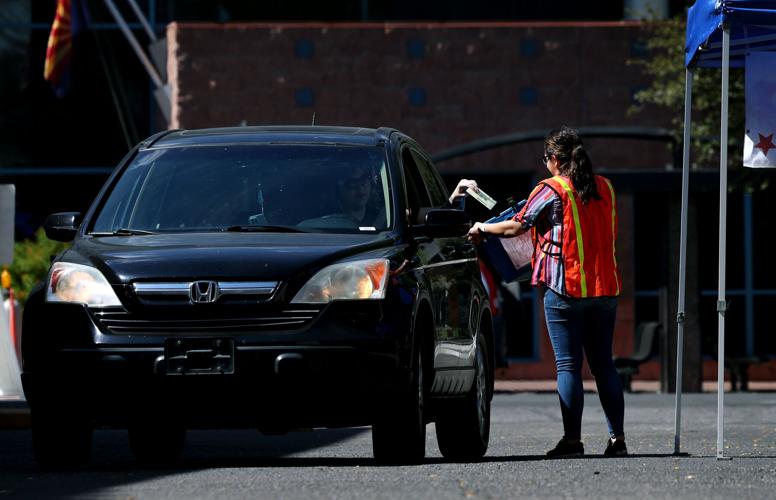You can thank Arizona’s Legislative Republicans for the endless ballot you may be filling out this weekend.
Eleven out of the 13 ballot measures you’re considering were sent to voters by GOP legislators. At least four are efforts to overcome vetoes by Gov. Katie Hobbs, a Democrat.
Since I’m struggling with them as much as the next voter, I thought I’d go through all the ballot measures, including the two citizen initiatives, and tell a bit of the backstory. My temptation is to vote against every legislative referral, as a protest as much as in opposition to the substance, and only consider the two citizen initiatives.

Arizona Daily Star columnist Tim Steller
Here’s my quick backgrounder on all 13 measures.
Prop. 133
Source: Legislature's referral
Type of change: Constitutional amendment
What it would do: Require traditional primary elections and block alternatives such as ranked-choice voting in charter cities
Background: As it became apparent a citizen initiative scrapping our current primary system had a good chance of making the ballot, legislative Republicans sought a way to overcome the measure, on the ballot as Prop. 140.
The result was this measure, which protects parties as the sources of general-election candidates and blocks ranked-choice voting, open primaries or other alternatives.
Prop. 134
Source: Legislature's referral
Type of change: Constitutional amendment
What it would do: Make it much harder to put a citizens initiative on the ballot
Background: For years, GOP legislators have passed laws and made other proposals making it harder to put initiatives on the ballot, a process that supersedes their lawmaking powers.
This referral would make it a lot harder to collect the signatures to put any issue on the ballot by forcing petition circulators to gather signatures all over the state rather than focusing on the metro areas. If passed, the signatures gathered for a constitutional amendment, new state law or referendum would have to come from a portion of voters in every legislative district in the state.
This would limit petition circulators’ ability to focus their efforts completely in the metro areas.
Prop. 135
Source: Legislature’s referral
Type of change: Constitutional amendment
What it would do: Give the Legislature power to limit emergency declarations by the governor
Background: This is a reverberation of the coronavirus pandemic. Legislative Republicans grew unhappy with fellow Republican Gov. Doug Ducey for keeping an emergency in place for two years, from March 2020 to March 2022.
They tried to place limits on the governor’s emergency powers in a 2023 bill, but Hobbs vetoed it. This proposal would force the governor to get the Legislature’s approval to extend an emergency beyond 30 days and would let the Legislature force a special session to force such changes.
Prop. 136
Source: Legislature’s referral
Type of change: Constitutional amendment
What it would do: Allow people to challenge the constitutionality of a citizen initiative before it goes to a vote
Background: Another effort to curtail Arizonans’ citizen initiative powers, this proposal would let anyone sue over the constitutionality of an initiative no sooner than 100 days before the election. The idea is to knock initiatives off the ballot before they’re voted on.
This is regularly done because of problems with signature collection now, but challenges to the constitutionality must wait until after an initiative is passed.
Prop. 137
Source: Legislature’s referral
Type of change: Constitutional amendment
What it would do: Protect two Arizona Supreme Court justices and eliminate retention elections for judges
Background: After the Arizona Supreme Court voted to uphold the 1860s-era ban on abortion, pro-choice forces mobilized to vote out the two supreme court justices who upheld the ban and are up for a retention election, Kathryn King and Clint Bolick.
To protect them and future judges, Republican legislators proposed this overhaul of judicial elections, which would eliminate retention votes except in special circumstances and be retroactive to the current election, protecting Bolick and King’s jobs.
Prop. 138
Source: Legislature’s referral
Type of change: Constitutional amendment
What it would do: Reduce the subminimum wage for tipped workers
Background: Prop. 138 exists to try to block an attempt to force restaurant employers to pay the full minimum wage to their staff. But that effort, called Raise the Wage Arizona, was thrown out in the courts. There is no proposal to eliminate tipping.
This proposal would let restaurants pay tipped workers a wage equivalent to 25 % lower than the minimum but also guarantee the workers would get at least $2 per hour more than the minimum.
Prop. 139
Source: Citizen initiative
Type of change: Constitutional amendment
What it would do: Enshrine abortion rights in the state Constitution up till fetal viability
Background: The pro-choice movement spun into action after the U.S. Supreme Court’s 2022 Dobbs decision, which allowed states to set their own abortion laws. If passed, this initiative would put the right to an abortion up till fetal viability — generally considered to be 22-24 weeks — in Arizona’s constitution.
After that stage, abortion would be allowed if necessary to protect the life or health of the mother. It would supersede the state law passed this year, which eliminated the 1860s ban and replaced it with a 15-week limit.
Prop. 140
Source: Citizen initiative
Type of change: Constitutional amendment
What it would do: Overturn Arizona’s partisan primary election system by putting all candidates in one primary
Background: This is the initiative that Prop. 133 exists to block. It would turn all primary elections into open elections in which all primary candidates run against each other and the winners go to the general election regardless of party. If the Legislature chooses, ranked-choice voting could be used in general elections instead of a two-person runoff.
The parties don’t like it, but it would make it easier for the 34 % of voters not registered with any party to use their potential influence.
Prop. 311
Source: Legislature’s referral
Type of change: State law
What it would do: Add a $20 fee convicted criminals must pay to fund a $250,000 benefit for fallen first responders
Background: The political roots of this proposal can be found in its nickname, the “Back the Blue Act.” It is a response to the criticisms of police and physical attacks on first responders in recent years. Proponents argue it will help recruit new officers.
Opponents note that survivors of fallen officers already receive generous benefits, including full replacement of the officer’s salary, paid out to the spouse, or a smaller amount to the children, as well as $437,000 in educational benefits for the children.
Prop. 312
Source: Legislature’s referral
Type of change: State law
What it would do: Give tax relief to property owners affected by unchecked drug use or homeless activities
Background: Hobbs vetoed a 2023 bill by Sen. Justine Wadsack that would have forced cities to act faster when complaints over transients are made. Lawyers also sued Phoenix and Tucson over their alleged unresponsiveness. Phoenix lost and was forced to clear “The Zone,” but Tucson won.
Under this proposal, property owners could get tax refunds for costs they incur if a city or county “follows a policy, pattern or practice of declining to enforce existing laws” prohibiting illegal camping, drug use, panhandling and other activities.
Prop. 313
Source: Legislature’s referral
Type of change: State law
What it would do: Require life in prison for a conviction of class 2 felony child sex trafficking
Background: State Sen. Shawnna Bolick, wife of Supreme Court Justice Clint Bolick, sponsored this effort, and her opinion in favor of it appears twice in the election pamphlet.
What doesn’t appear in any of the arguments for Prop. 313 is evidence that judges are sentencing child sex traffickers too leniently. They already have the option of sentencing people convicted of this class 2 felony to life imprisonment but may impose a lesser sentence if the circumstances warrant.
Prop. 314
Source: Legislature’s referral
Type of change: State law
What it would do: Allow Arizona police to arrest people who cross the Mexican border between ports of entry, and more
Background: Hobbs vetoed a bill with the border-crossing language in March. The GOP Legislature added additional measures tangentially related to the border and sent it to voters instead.
Beyond the arrest language, it adds higher penalties for deaths linked to smuggled fentanyl — but leaves aside deaths linked to domestically sourced fentanyl. It also requires the state to check the federal E-verify system before offering public benefits.
Prop. 315
Source: Legislature’s referral
Type of change: State law
What it would do: Require the Legislature to approve any change in state rules that will cost more than $500,000
Background: Another effort to work around a veto by Hobbs of a bill, by members of the Legislature’s right-wing Freedom Caucus. It would prohibit the state from imposing a rule that costs more than $500,000 over five years without the Legislature’s approval.

A voter uses the curbside ballot drop-off this week at the Pima County Recorder’s office, 240 N. Stone Ave.
Former President Barack Obama speaks Friday at Tucson's "Get Out the Vote" rally.
Video by Kimberly Kalil, Arizona Daily Star





